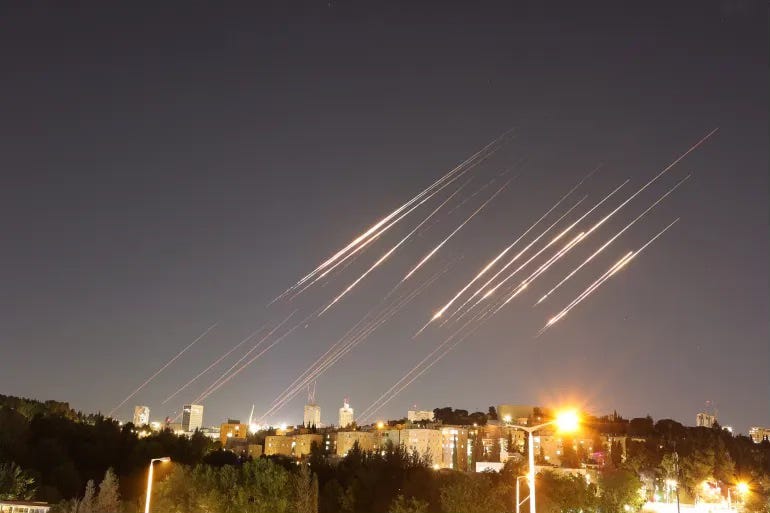Forged in Fire: Iran's Four-Decade Resistance Against Western Coercion
The narrative of Iran as an isolated nation crushed under four decades of Western sanctions requires fundamental revision. Rather than capitulating to economic warfare, Tehran has demonstrated remarkable adaptability across diplomatic, economic, and military domains—emerging as a case study in resistance against hegemonic pressure. This resilience unfolds amid escalating regional tensions, where Israel's military actions in Gaza and against Iranian targets expose the limitations of Western-backed security architectures.
Diplomatic Adaptation: The Eastern Pivot and Regional Re-engagement
Iran's diplomatic survival strategy has centered on two key maneuvers: deepening alliances with Eastern powers and exploiting fractures in the Western-led order. The 2023 China-brokered détente with Saudi Arabia marked a watershed moment, shattering U.S. hopes for an anti-Iran Arab-Israeli axis . This realignment accelerated as Gulf states—fearful of regional conflagration—transitioned from supporting "maximum pressure" to actively mediating between Washington and Tehran. In April 2025, Saudi Defense Minister Prince Khalid bin Salman delivered an urgent warning from King Salman to Supreme Leader Khamenei: negotiate seriously with the Trump administration or risk Israeli military action . This diplomatic intervention underscores Iran's success in compelling regional rivals to acknowledge its staying power.
Simultaneously, Tehran strengthened strategic partnerships with Moscow and Beijing, using these relationships to mitigate sanction impacts. Russia provides military technology exchanges and economic lifelines, while China's backing proved instrumental in normalizing Iran's regional standing despite U.S. objections. The emerging multipolarity enabled Iran to transform from pariah to participant in shaping the Gulf security framework.
Economic Resilience: Evasion and Internal Pressures
Sanction Evasion Networks: Facing comprehensive U.S. financial isolation, Iran developed sophisticated parallel financial systems. These include shadow banking channels across the Gulf, barter arrangements for oil exports (notably with China and Venezuela), and cryptocurrency transactions circumventing dollar-based systems. The 2025 Israeli strikes revealingly targeted economic nodes like the Central Bank, acknowledging their role in sustaining resistance .
Internal Contradictions: Economic resilience carries severe domestic costs. Rampant inflation and currency devaluation triggered nationwide protests, met with intensified repression. The regime's "special courts" for economic crimes executed dozens since 2024 while ignoring systemic corruption within Revolutionary Guard-controlled enterprises . Despite official rhetoric of "resistance economy," internal criticism mounted over resource diversion to regional proxies instead of domestic needs. President Masoud Pezeshkian's election reflected public desperation for sanctions relief through renewed nuclear talks .
Military Posture: Asymmetric Power and Strategic Setbacks
Iran's military strategy prioritizes asymmetric capabilities and proxy warfare, compensating for conventional weaknesses:
- Missile and Drone Arsenal: Investments in precision missiles and drone swarms provide deterrence and strike capacity, showcased in the April 2025 retaliatory salvo against Israel after the Damascus consulate attack. Hardliners framed this as "missile supremacy delivering economic security" .
- Proxy Network Erosion: The once-formidable "Axis of Resistance" suffered devastating blows. Israeli operations decimated Hamas and Hezbollah leadership, while Syria's pro-Iran regime collapsed in 2024 . These losses undermined Tehran's regional influence projection.
- Defensive Vulnerabilities: Israel's June 2025 strikes exposed catastrophic gaps in Iranian air defense. Attacks killed top Revolutionary Guard commanders and nuclear scientists, with internal officials lamenting, "Where is our air defense?" and noting Israel’s apparent infiltration of security services . The inability to protect critical assets or civilians revealed the regime's operational incompetence despite massive military spending.
Hegemony Reconsidered: Coercion’s Diminishing Returns
The Iranian experience challenges traditional hegemony models. Antonio Gramsci’s insight—that sustainable dominance requires *consent* alongside coercion—explains Western failures . U.S. strategy relied overwhelmingly on punitive measures while offering no political or economic vision attractive to ordinary Iranians. Sanctions did not produce submission but instead:
- Forged new Eurasian economic partnerships
- Accelerated indigenous military industrialization
- Strengthened hardliners' narrative of resistance
Meanwhile, America’s regional credibility eroded as its security guarantees failed to prevent Israeli actions threatening Gulf stability . With 800+ global bases unable to impose outcomes favourable to Washington, the hegemonic model appears increasingly unsustainable against determined regional actors.
Conclusion: Resilience Amid Fragility
Iran’s endurance through four decades of pressure reflects strategic adaptation, but not invulnerability. Its economy staggers under corruption and mismanagement; its military suffers humiliating penetrations; its regional influence wanes. Yet Western coercion consistently underestimates national pride and institutional survival instincts. The emerging "Arabian Axis"—led by Saudi Arabia—now seeks regional equilibrium *with* Iran, not against it . This strategic rebalancing, alongside Iran’s domestic fractures, suggests that its future trajectory hinges less on external pressure than on internal dynamics: Can a populace exhausted by isolation and repression force a recalibration toward pragmatism and peace? The resilience Iran demonstrated may yet find its highest expression not in defiance, but in transformation.
Declaration of war
Editorial (Dawn, Pakistan)
ISRAEL’S provocative behaviour has, once again, brought the Middle East to the precipice of a full-blown war.
The Zionist state’s attack on Iran, which began early on Friday morning and was continuing at the time these lines were being written, has the potential of setting the already fragile region on fire, and sending the global economy into a tailspin. A large number of fatalities have been reported, including women and children, and residential areas have been hit along with military targets.
Among the victims have been the Iranian army’s chief of staff, as well as the head of the powerful Pasdaran, along with several senior scientists. Several Iranian cities have been attacked, indicating that Israel had deep intelligence about key Iranian facilities and personnel. It is no wonder that Tehran has termed Israel’s reckless attack a ‘declaration of war’.
Tel Aviv has said it attacked Iran because of the supposed threat it posed to “Israel’s very survival”. This is contrary to the facts. It has been Israel that has constantly been provoking Iran. The bombing of Iranian diplomatic facilities in Damascus as well as the assassination of Hamas leader Ismail Haniyeh in Tehran last year, which resulted in two separate Iranian missile and drone barrages targeting Israel, are proof.
In fact, Israel has continuously been threatening regional peace for decades by attacking and pillaging other countries. Over the last few years, along with the murderous rampage in Gaza, Israel has attacked Syria, Lebanon, Yemen and now Iran. So Tel Aviv’s ‘self-defence’ alibi is hardly believable. The plain truth is that Israeli behaviour is a threat to world peace.
There has been condemnation of the Israeli attacks from several states, particularly the Muslim bloc. The Pakistani leadership as well as parliament have denounced Tel Aviv’s aggression and expressed solidarity with Tehran.
Yet others see the aggression differently; for example, US President Donald Trump says the offensive was “excellent” and has boasted that there is more in store. But he has also perplexingly asked Iran to return to the negotiating table. It is unlikely Iran will negotiate with a gun to its head. The Iranian leadership has promised to avenge the attack. It should be remembered that Iran has survived a brutal eight-year war with Iraq, and the Iranians are adept at playing the long game.
Israel has threatened that the attacks will continue for as long as needed; the Iranians may just take them up on the ‘offer’. The world stands at a very dangerous crossroads here. If the US joins in the ‘defence’ of Israel, matters may spiral out of control. The UNSC is meeting to address the issue, and though expectations should be modest, full efforts are needed to stop this new war.
Published in Dawn, June 14th, 2025















Share this post